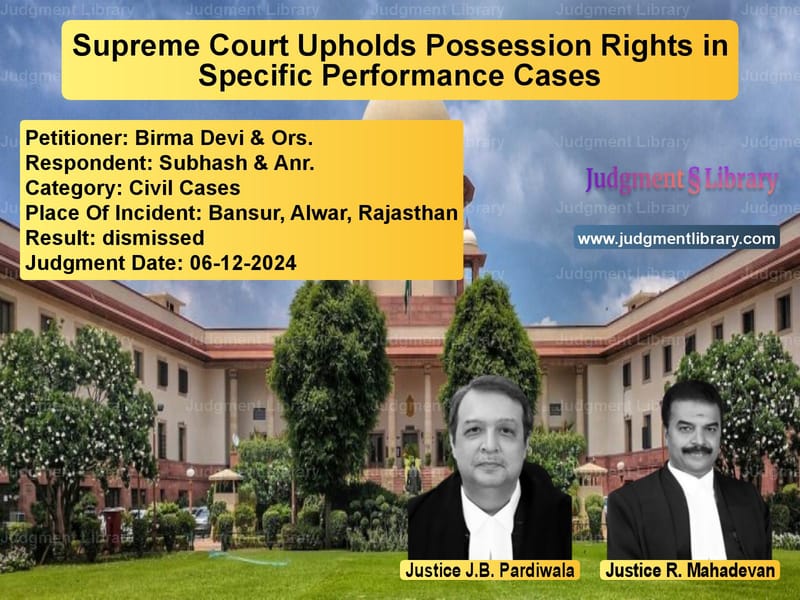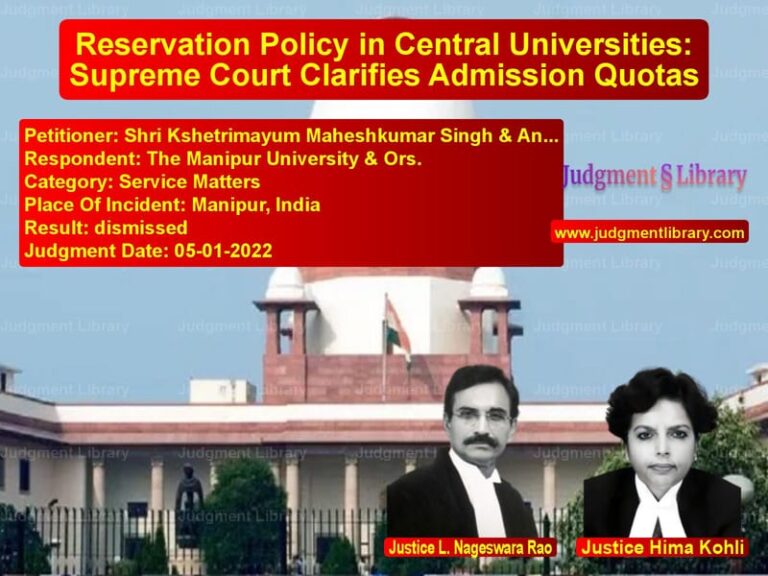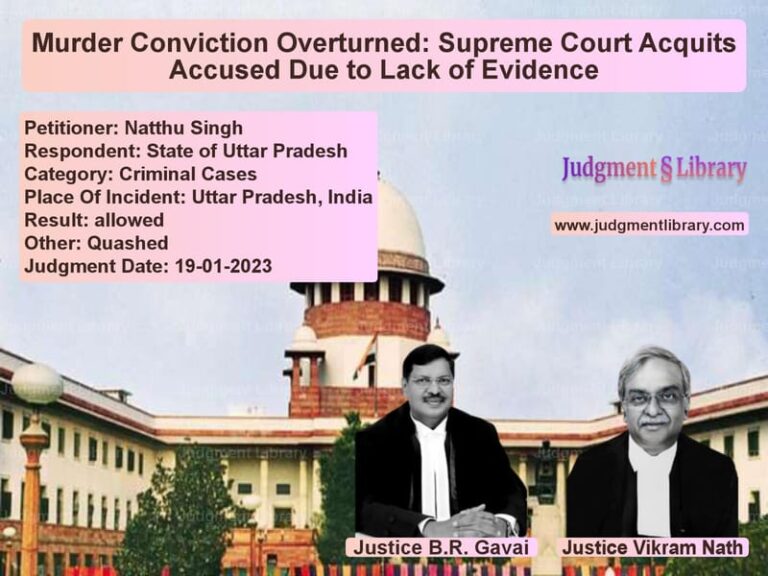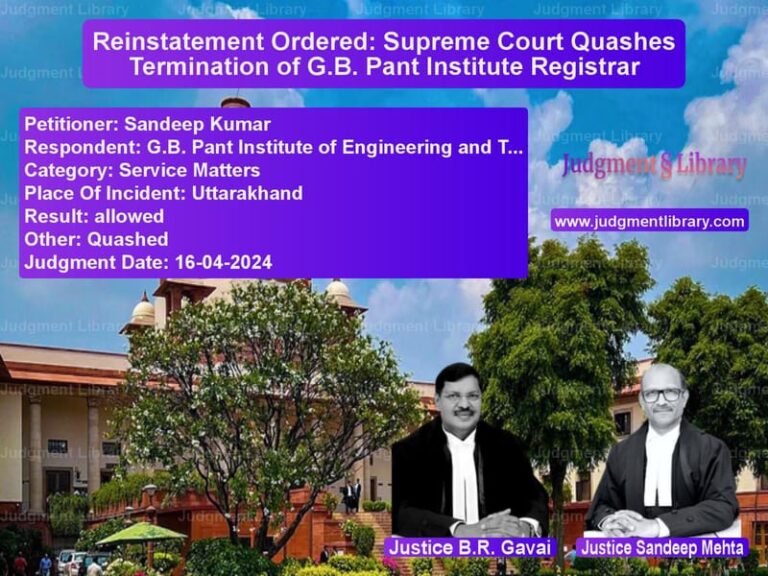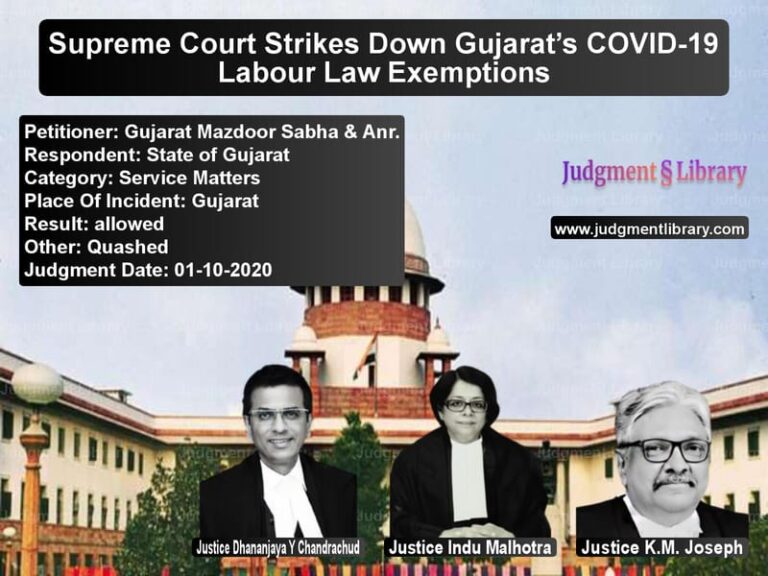Supreme Court Upholds Possession Rights in Specific Performance Cases
The Supreme Court of India recently ruled in the case of Birma Devi & Ors. v. Subhash & Anr., clarifying the law on the execution of decrees in specific performance cases. The ruling established that in certain cases, an executing court can grant possession even if the original decree does not expressly mention it. This decision reinforces the principle that a successful decree-holder in a specific performance case is entitled to complete relief, including possession, without the need for separate proceedings.
Background of the Case
The dispute arose from a property transaction in Rajasthan. The respondents (original plaintiffs) had entered into a sale agreement with the original defendant, who later sold the suit property to the petitioners (subsequent purchasers). The plaintiffs sued for specific performance and obtained a decree in their favor. However, during execution, the executing court refused to grant possession, citing the absence of an explicit direction in the decree.
The decree-holders challenged this order in the Rajasthan High Court, which ruled in their favor, directing the executing court to issue a possession warrant. Aggrieved by this order, the petitioners (subsequent purchasers) approached the Supreme Court.
Key Legal Issues
- Can an executing court grant possession in a specific performance decree if possession is not explicitly mentioned in the decree?
- Does the absence of a possession clause require decree-holders to initiate fresh legal proceedings?
- What are the implications of Section 22 of the Specific Relief Act on execution proceedings?
Arguments by the Petitioners
The petitioners contended:
- The decree for specific performance did not include an express order for possession.
- The decree-holders must file a separate suit for possession, as per procedural requirements.
- The High Court exceeded its jurisdiction by modifying the decree at the execution stage.
Arguments by the Respondents
The respondents (decree-holders) argued:
- Under settled legal principles, possession is an inherent right in a decree for specific performance.
- Forcing a decree-holder to file a separate suit for possession would lead to unnecessary litigation and delay.
- The High Court rightly exercised its jurisdiction to ensure complete relief to the decree-holder.
Supreme Court’s Observations
The Supreme Court cited the landmark case of Babu Lal v. Hazari Lal Kishori Lal (1982) and reaffirmed two key principles:
- Where possession remains with the seller: A decree for specific performance, even if it does not explicitly mention possession, implies that possession must be transferred to the buyer.
- Where possession is held by a third party: If possession has passed to someone else, the decree-holder must explicitly seek possession or additional relief such as partition.
The Court emphasized:
“Where exclusive possession is with the contracting party, a decree for specific performance simpliciter, without specifically providing for delivery of possession, may give complete relief to the decree-holder.”
Read also: https://judgmentlibrary.com/supreme-court-regularizes-admissions-of-mds-students-in-madhya-pradesh/
The Court further held that Section 22 of the Specific Relief Act allows an amendment of pleadings at any stage, including during execution, to seek possession if it was not initially included.
Final Judgment
The Supreme Court dismissed the Special Leave Petition and upheld the High Court’s decision. It ruled:
- An executing court has the authority to grant possession in specific performance cases where the decree-holder is entitled to it.
- The petitioners (subsequent purchasers) had no legal standing to challenge the decree.
- Requiring decree-holders to file a separate possession suit would lead to unnecessary litigation.
Implications of the Judgment
This ruling has far-reaching implications in real estate and contract law:
- Reduces litigation: Ensures that decree-holders are not forced into multiple suits to obtain possession.
- Strengthens buyer protection: Purchasers enforcing specific performance can now obtain possession without further legal hurdles.
- Clarifies execution procedure: Reinforces the power of executing courts to grant possession as part of their duty to enforce judgments.
Conclusion
The Supreme Court’s judgment in Birma Devi & Ors. v. Subhash & Anr. is a crucial development in Indian contract law, ensuring that decree-holders in specific performance cases receive full and effective relief. By affirming that possession can be granted at the execution stage, the Court has streamlined property litigation and reinforced the principle of justice over procedural technicalities.
Petitioner Name: Birma Devi & Ors..Respondent Name: Subhash & Anr..Judgment By: Justice J.B. Pardiwala, Justice R. Mahadevan.Place Of Incident: Bansur, Alwar, Rajasthan.Judgment Date: 06-12-2024.
Don’t miss out on the full details! Download the complete judgment in PDF format below and gain valuable insights instantly!
Download Judgment: birma-devi-&-ors.-vs-subhash-&-anr.-supreme-court-of-india-judgment-dated-06-12-2024.pdf
Directly Download Judgment: Directly download this Judgment
See all petitions in Specific Performance
See all petitions in Property Disputes
See all petitions in Judgment by J.B. Pardiwala
See all petitions in Judgment by R. Mahadevan
See all petitions in dismissed
See all petitions in supreme court of India judgments December 2024
See all petitions in 2024 judgments
See all posts in Civil Cases Category
See all allowed petitions in Civil Cases Category
See all Dismissed petitions in Civil Cases Category
See all partially allowed petitions in Civil Cases Category

